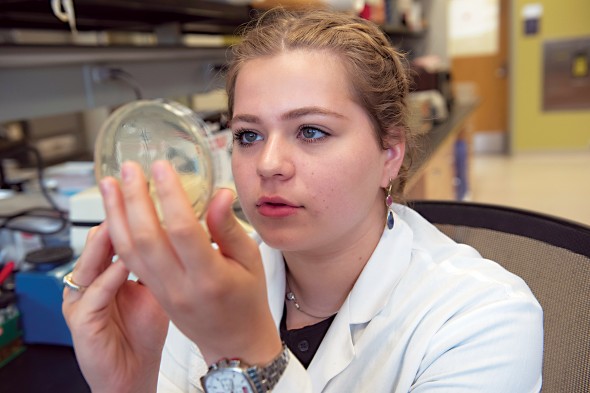East Meets West: Making MOST of summer
Undergraduate students in a summer research program at UIC are making the most of their experience in oral health science research.
“The interesting thing about the oral sciences is that it affects the body in different ways,” said Anakarina Bedran-Russo, associate professor in restorative dentistry and director of applied biomaterials and interfaces. “So when we’re thinking about oral sciences, we’re talking about craniofacial types of research. It can be about the teeth, head, soft tissue or tissue regeneration.”
Bedran-Russo is also the director of the T32 Multidisciplinary Oral Science Training Program (MOST). The umbrella program, which is funded by the National Institute of Dental and Craniofacial Research, is based on UIC’s west side, where cutting-edge medical research takes place. Students and postdoctoral fellows — from disciplines on the east and west sides of campus —participate in the multidisciplinary science training program to learn how to contribute to and influence the future of oral health research and clinical care.
The MOST Summer Research experience is a full-time, 12-week program that gives students interested in biomedical or biological sciences a chance to complete a research project in laboratories on campus and under the direction of grant-funded faculty.
“Many people may not necessarily be interested in becoming dentists, but actually have a specific interest in a disease process that can be studied through craniofacial development or craniofacial biology,” said Bedran-Russo. “So a lot of the researchers that these students can work with go beyond dental school.”
Faculty mentors from dentistry, medicine and pharmacy address questions about a wide range of health issues — from HIV prevention and diabetes to cancer research.
The competitive summer program also includes weekly, instructional seminars and career development opportunities, along with a stipend of $3,500.
“The program gives students a structured research experience,” said Luisa DiPietro, associate vice chancellor for research. She’s also a professor and associate dean of faculty affairs in the UIC College of Dentistry as well as director of the Center for Wound Healing and Tissue Regeneration.
“They not only get lab experience, they’re taught certain really important elements of research.”
DiPietro has mentored more than 70 students and postdoctoral fellows. This year, she’s mentoring Hoda Fakhari, an Honors College student double majoring in English and biochemistry.
“Hoda is looking at how the cells in the oral cavity respond to injury and how that response is different than those in the skin,” said DiPietro, whose research revolves around wound healing, healing response and tissue regeneration following injury.
DiPietro has received more than $14 million in funding for research projects from the National Institutes of Health.
“I’m really excited,” said Fakhari. She’s the only MOST undergraduate participant at her research site. “You’re treated as part of the team, so it’s really nice to join a lab and feel like you’re working towards the same goal as everyone else, even as an undergrad.”
“We’re trying to shift away from textbook-based learning,” said Lin Tao, a microbiologist and professor of oral biology. He’s mentoring Shira Berger, whose summer research is focused on optimizing the process of production for a private drug company. “Our students can actually solve existing problems,” he said.
“Doing research teaches you to think in a different way than you normally would,” said Berger, a biological sciences student in the College of Liberal Arts and Sciences. “It teaches you to think about the bigger picture and think analytically to produce outcomes.”
Participants present their projects at a symposium in August. They’re also encouraged to send abstracts to the American Association for Dental Research. Two students were invited to present their findings at the group’s annual meeting last year.
“The real measure of your success is who you train and encourage,” said DiPietro. “Because that’s the real legacy: the people that follow.”

